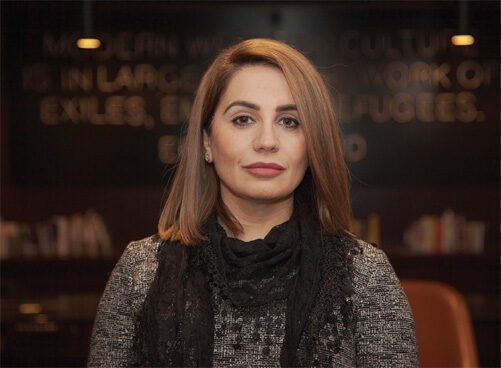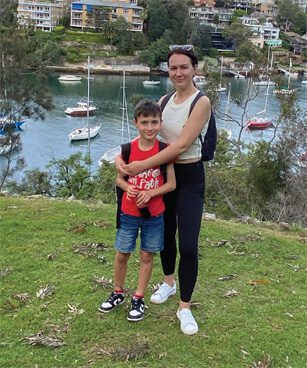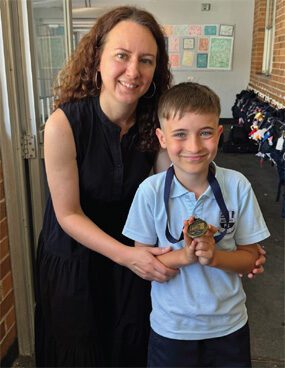With Refugee Week in June, North Shore Living celebrates diversity with personal stories of resilience, hope and building a new life
Deena Yako and her family left Iraq on a cold, overcast day in 1986 when she was nine years old. Deena and her brother thought they were going to a wedding, when a car arrived at her grandmother’s house to collect the family.
“Something felt strange, but I couldn’t quite put my finger on it,” Deena recalls. “I cannot forget my grandmother’s tears as her body gave in as the car drove off. Why was she so emotional about us leaving? Surely, we were coming back. But we never returned to our home.”
Deena, who runs Refugee Stories for Change, an education program for the Refugee Council of Australia (RCOA), arrived 35 years ago on our shores. But she remembers the turmoil of leaving her home as if it was yesterday.
The Sydney-sider recalls how she and her family barely survived a 15-day trek through rain and snow.
“We walked for days on end without proper food, shelter and clothing,” Deena says. “We barely made it alive to the border of Iran, and we were exhausted and afraid, but hopeful that we may have a chance at reaching safety. What we faced on this journey in the mountains does not even come close to what we had endured in Iraq during the war.”
They were treated like criminals in the detention centre, Deena says, living in a small room in an army barracks surrounded by barbed wire. They had limited rations of rice, beans, potatoes, eggs and occasionally meat, all carefully weighed.
“We weren’t starving, but we didn’t have enough either,” Deena explains. “And we barely had electricity or running water, and access to showers was impossible. We had to heat water and shower in the public toilets.”
Children had no access to education, and parents weren’t allowed to work, and the days and nights melded into one. The family’s mental health suffered.
“My parents struggled a great deal, but they put on a brave face for the sake of me and my little brother. I can only imagine how hard that would have been for them,” Deena reflects. “They left their whole life, their identity and their family behind for a chance to be free of fear and persecution.”
Thousands of people seek asylum in Australia, fleeing their homeland to find safety for their families. During 2023/24, 16,750 Refugee and Special Humanitarian Program visas were granted – and a further 36,000 were refused.
Refugee Week from 15 to 21 June has the theme Finding Freedom: Diversity in Community and will celebrate the inclusive Australian communities that open their arms to those seeking refuge, promoting connection and a sense of belonging.

Deena encourages everyone to get involved in Refugee Week
Deena says her family could never return to Iraq or integrate in Iran, so resettlement to another country was the only option available to the family.
After spending over three years in detention, Deena’s family arrived in Australia in 1990 under the Refugee Humanitarian Program.
“Everything was different; the climate, the people, the traffic directions, the houses, the streets, and even the air felt different,” says Deena. “Add to that having to learn a new language as a teenager, navigating the education system, learning about your surroundings and then on top of it all, you are continuously harassed, bullied and discriminated against simply because you don’t speak English well.”
Australia gave the family hope for the future, although it took three years for Deena to call Australia home when her English was better, and she felt part of the community.
Through her work at RCOA, Deena trains, mentors and creates opportunities for refugee speakers to tell their stories.
“We believe that our stories should be told, should be heard and should be celebrated,” says Deena. “By going out and speaking our truths, we can shift negative misconceptions about refugees. Every face has a story, and every story has a face.”
In 2022, Nadia Mohylna, 41, and her son Illia, nine, left Ukraine to escape the war. She had no savings, no English, and no idea where to begin and landed in Sydney on a temporary humanitarian visa.
“It was one of the biggest challenges of my life,” Nadia tells NL. “It shattered my sense of stability and tore me away from my home, my professional environment and my support system.”
Nadia says her experience as a war refugee transformed her identity, as she was stripped of everything that defined who she was.
“I had to meet myself again – to discover resilience, the ability to learn, to be braver, ask for help and rebuild from nothing,” says Nadia.

Nadia and Illia love loving in Mosman
Nadia worried about not having enough money for the necessities like food, shelter, and clothing. She was grateful for government financial support, particularly as a single mother.
Nadia and Illia initially stayed with a friend she had in Sydney (who had paid for their flights to Australia). Settlement Services International (SSI), a community organisation, supplied Nadia with furniture, appliances and other household items when she found an apartment to rent. The Ukrainian community also supported Nadia and meeting other Ukrainians was important to her.
It was tough for Illia starting at Mosman Public School without a word of English – the school helped with uniforms and school supplies. Last year, he received two awards at school and Nadia is immensely proud of him, especially as she could not afford extra tutoring.
Illia has also joined Mosman Football Club and loves playing soccer.
“It’s beautiful here, but the most important thing for me is the sense of security and the people,” says Nadia. “The community is incredibly kind and supportive. We have received help – both practical and emotional – often from people we didn’t even know. I really appreciate it.”
Nadia and Illia now have permission to stay indefinitely in Australia.
There are other refugee programs in Australia which allow the community to provide help directly. Through CRISP (Community Refugee Integration and Settlement Program), refugee category visa holders receive settlement support directly from trained Community Supporter Groups (CSGs). CSGs are a group of five or more adults who provide wraparound settlement and integration support to refugees for 12 months from their arrival in Australia. CSGs can help with registration for government support, accessing education, linking them with employment services and attending appointments. Refugees are referred to Australia by the United Nations High Commissioner for Refugees (UNHCR) for resettlement.

Nadia is very proud of Illia
“Thanks for the new life and opportunity you guys gave me. God bless you all.” Daniel, refugee from Iran

Daniel received a warm welcome from the community support group
Anne Nesbitt coordinates Community Refugee Sponsorship Australia (CRSA) groups on the North Shore and is part of the Lower North Shore Refugee Support Group (LNSRSG). Volunteers can have specific skills to bring to the table, but Anne says what people need most is compassion and a willingness to help people.
The group welcomed Daniel to Sydney on 20 March this year. After Daniel, now 33, left Iran, he spent 12 years in Kuala Lumpur waiting to be resettled somewhere. One of Anne’s group gave Daniel a granny flat to stay in. Daniel has settled into life here and has enrolled in TAFE. He would also like to volunteer at an asylum seeker centre.
“I’m very happy to be in this beautiful part of the world,” says Daniel. “Thanks for the new life and opportunity you guys gave me. God bless you all.”
“We’re not here to make his decisions,” Anne says. “We are here to be a bridge, and research shows that people who are welcomed by a community group have far higher success rates of integration because they are cared for by people. We walk with them along the journey.”
15 TO 21 JUNE
Visit refugeeweek.org.au for events in your area
CRSA program: email Anne Nesbitt at community@endchilddetention.org
Ukraine Council of NSW: ucnsw.org








